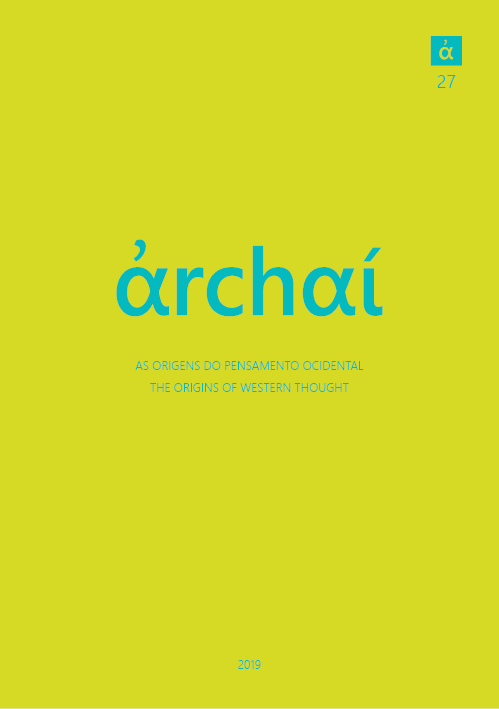On the “Perceptible Bodies” at De Generatione et Corruptione II.1
Keywords:
Aristotle, Physics, Generation, Bodies, Perceptibility, Elements, Prime Matter, Contact, TangibilityAbstract
Near the beginning of De Gen. et Cor. II.1, Aristotle claims that the generation and corruption of all naturally constituted substances are “not without the perceptible bodies” (328b32-33). It is not clear what he intends by this. In this paper I offer a new interpretation of this assertion. I argue that the assumption behind the usual reading, namely, that these “perceptible bodies” ought to be distinguished from the naturally constituted substances, is flawed, and that the assertion is best understood as a claim that Aristotle has established in the second half of the first book of the De Gen. et Cor.
Downloads
References
BURNET, J. (1930). Early Greek Philosophy. 4ed. London, Adam and Charles Black. (1ed 1892).
CHARLTON, W. (1970). Aristotle’s Physics Books I and II. Translated with an Introduction and Notes. Oxford, Clarendon Press.
CHARLTON, W. (1983). Prime Matter: A Rejoinder. Phronesis 28, p. 197-211.
CLEARY, J. (1995). Aristotle and Mathematics: Aporetic Method in Cosmology and Metaphysics. Leiden, Brill.
CROWLEY, T. J. (2008). Aristotle’s ‘So-Called Elements’. Phronesis 53, p. 223-242.
DE HAAS, F. (1997). John Philoponus’ New Definition of Prime Matter. Leiden, Brill.
DE HAAS, F.; MANSFELD, J. (eds.) (2004). Aristotle’s On Generation and Corruption, Book I. Symposium Aristotelicum. Oxford, Oxford University Press.
FORSTER, E. S. (1955). Aristotle. On Coming-To-Be and Passing-Away. London/Cambridge, Heinemann/Harvard University Press.
FREDE, M. (2000). Introduction. In: FREDE, M.; CHARLES, D. (eds.). Aristotle’s Metaphysics Lambda. Symposium Aristotelicum. Oxford, Clarendon Press, p. 1-52.
FREDE, M.; CHARLES, D. (eds.) (2000). Aristotle’s Metaphysics Lambda. Symposium Aristotelicum. Oxford, Clarendon Press.
FREGE, G. (1892) Über Sinn und Bedeutung. Zeitschrift für Philosophie und philosophische Kritik 100, p. 25-50.
FURTH, M. (1988). Substance, Form and Psyche: An Aristotelean Metaphysics. Cambridge, Cambridge University Press.
GILL, M. L. (1989). Aristotle on Substance. Princeton, Princeton University Press.
GRAHAM, D. W. (1987). The Paradox of Prime Matter. Journal for the History of Philosophy 25, p. 475-490.
GRANGER, H. (2000). Z.11, 1036b28: aisthêton OR aisthêtikon? Classical Quarterly 50, n. 2, p. 415-427.
GUTHRIE, W. K. C. (1981). A History of Greek Philosophy. Vol. 6: Aristotle. Cambridge, Cambridge University Press.
HUSSEY, E. (1983). Aristotle’s Physics III and IV. Translated with an Introduction and Notes. Oxford, Clarendon Press.
JOACHIM, H. H. (1922). Aristotle. On Coming-to-be and Passing-away. Oxford, Clarendon Press.
JONES, B. (1974). Aristotle’s Introduction of Matter. Philosophical Review 83, p. 474-500.
KING, H. R. (1956). Aristotle without Prima Materia. Journal for the History of Ideas 17, p. 370-387.
LEWIS, F. A. (2008). What’s the Matter with Prime Matter? In: SEDLEY, D. (ed.). Oxford Studies in Ancient Philosophy. Vol. 34. Oxford, Oxford University Press, p. 123-146.
LLOYD, G. E. R. (1968). Aristotle: The Growth and Structure of his Thought. Cambridge, Cambridge University Press.
LONGRIGG, J. (1993). Greek Rational Medicine: Philosophy and Medicine from Alcmaeon to the Alexandrians. London, Routledge.
LOUX, M. J. (1991). Primary Ousia: An Essay on Aristotle’s Metaphysics Z and H. Ithaca, Cornell University Press.
MCMULLIN, E. (ed.) (1965). The Concept of Matter in Greek and Medieval Philosophy. 2ed (paperback edition). Indiana, University of Notre Dame Press. (1ed 1963)
MILLER, F. D. (1978). Aristotle’s Use of Matter. In: SIMMONS, G. C. (ed.). Paideia: Special Aristotle Issue. Second Special Issue. Brockport, State University College, p. 105-119.
MUGLER, C. (1966). Aristote. De la Génération et la Corruption. Texte établi et traduit. Paris, Les Belles Lettres.
RASHED, M. (2005). Aristote. De la Génération at la Corruption. Texte et Traduction. Paris, Les Belles Lettres.
ROBINSON, H. M. (1974). Prime Matter in Aristotle. Phronesis 19, p. 168-188.
SCALTSAS, T. (1998). Argument Analysis of Aristotle’s On Generation and Corruption. Project Archelogos. Avaialble at http://archelogos.com/xml/toc/toc-gci.htm. Accessed on 11/04/2018.
SOLMSEN, F. (1958). Aristotle and Prime Matter: A Reply to Hugh R. King. Journal for the History of Ideas 19, p. 243-252.
WILLIAMS, C. J. F. (1982). Aristotle’s De Generatione et Corruptione. Translated with notes. Oxford, Clarendon Press.
Downloads
Published
How to Cite
Issue
Section
License
Given the public access policy of the journal, the use of the published texts is free, with the obligation of recognizing the original authorship and the first publication in this journal. The authors of the published contributions are entirely and exclusively responsible for their contents.
1. The authors authorize the publication of the article in this journal.
2. The authors guarantee that the contribution is original, and take full responsibility for its content in case of impugnation by third parties.
3. The authors guarantee that the contribution is not under evaluation in another journal.
4. The authors keep the copyright and convey to the journal the right of first publication, the work being licensed under a Creative Commons Attribution License-BY.
5. The authors are allowed and stimulated to publicize and distribute their work on-line after the publication in the journal.
6. The authors of the approved works authorize the journal to distribute their content, after publication, for reproduction in content indexes, virtual libraries and similars.
7. The editors reserve the right to make adjustments to the text and to adequate the article to the editorial rules of the journal.



